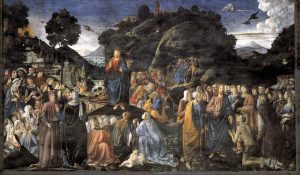Thoughts on the Lessons for All Saints’ Day, Nov. 6, 2022
(All Saints’ Day is celebrated on Nov. 1, but may also be celebrated in the liturgy for the following Sunday.)
First Reading (Track One): Daniel 7:1-3; 15-18
We remember all saints, known and unknown, on All Saints’ Day.

Jesus Proclaims the Beatitudes (1481-1482), fresco by Cosimo Rosselli (1439-1507). Sistine Chapel, Vatican City, Rome. (Click image to enlarge.)
Our Track One first reading might remind us of Revelation. Much of the book of Daniel (one of the latest books of the Hebrew Bible) is apocalyptic literature, an imaginative genre that remained popular during early Christianity. Like our science fiction and fantasy, writing in this genre was understood as symbolic, not literal. Daniel tells of a vivid dream about four scary beasts that represent earthly kings. In later verses, we meet a winged lion, a tusked bear, a four-headed leopard, and an iron-toothed monster with 10 horns! But the nightmare ends with reassurance that resonates as we recall all who have died and gone to their eternal rest: God will win and reign forever.
Psalm: Psalm 149
Psalm 149 is one of the psalms that celebrates warlike violence in language that reflects Bronze Age sensibility in the Ancient Near East. Listen, though, and we can hear its echoes all too well in the imagery of modern warfare, shock and awe. We sing to the Lord a new song, joyously dancing and shaking tambourines to celebrate God’s gift of victory in battle, while the enemy’s kings are bound in iron chains. Before we judge too harshly, recall that the Psalms, the bible’s ancient hymnal, offer a full human range of emotion, from this warrior shout to the protective love of the Good Shepherd.
Second Reading: Ephesians 1:11-23
God has placed Christ at the right hand of the Creator and has given Christ great power to rule over us all, in the present and for all time to come. Thus the author of Ephesians assures his flock, writing in Paul’s name to the persecuted Christians of Ephesus in Asia Minor. From that time onward, all the people of God, baptized in Christ and sealed by the Spirit, are the saints of God. We are Christ’s body on earth, pledged through our inheritance through baptism to redemption as God’s own people.
Gospel: Luke 6:20-31
How well do you know the Beatitudes? Matthew’s narrative of Jesus’ Sermon on the Mount comes to mind for most of us: These are memorable directions toward a life of service and neighborly love. Listen for the differences, though, in the evangelist Luke’s distinctly different view of the Beatitudes. Luke’s version in Jesus’ Sermon on the Plain is more directly focused on caring for the poor. By “poor,” Luke explicitly means those who have no money or resources, not only the “poor in spirit” who Matthew invokes. What’s more, Luke’s version expects us to give food to the hungry and water to the thirsty, not simply to stand with those who “hunger and thirst for righteousness” as Matthew suggests. Don’t just turn the other cheek, says Luke: Forgive your enemies … and pray for them too.
